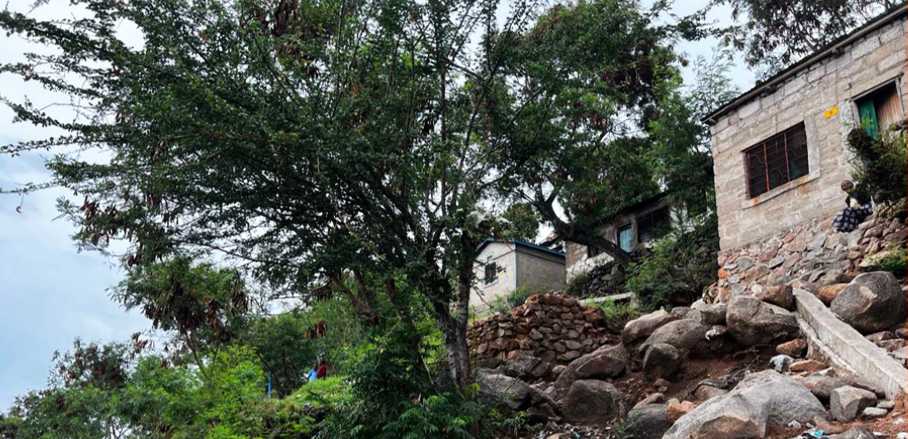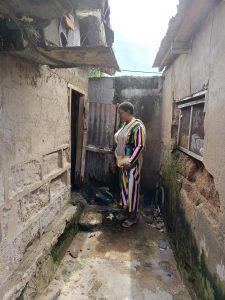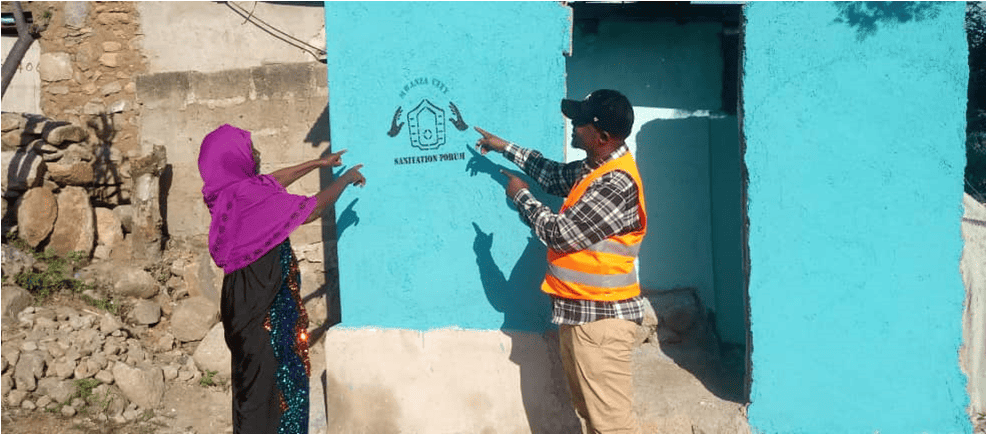Safeguards Against Physical and Mental Health: Just and Gendered Sanitation in Tanzania
Women in Tanzania often suffer from deplorable housing conditions including horrendous sanitation. Tatu Mtwangi Limbumba knows why and what to do about it.
Neema lives in an informal settlement among the rocky hills of Mwanza town, which is situated on the shores of Lake Victoria. Neema has another name but would prefer to stay anonymous. The 32-year-old woman rents one room in a compound comprising many other households. The absentee landlord lives somewhere in the village about 150 kilometres away from Mwanza. The quality of the house is lacking, but Neema says:
This is the room that I could afford when I moved to Mwanza in 2016 to seek a better life. I hawk fruits in the city. The house is not in very good condition; for example, you can see the toilet facility is very poor and in need of repairs. About 20 people are using the toilet, including children. The door doesn’t lock properly, and it’s located near a public footpath so there is very little privacy. Usually, I don’t feel very happy or safe using it. But at least we get clean running water for personal use from our neighbours.

Mwanza Housing. Private rental housing is the most common housing option in Tanzania © OVERDUE research project
Neema represents the plight of many women with very little income who move to the city looking for livelihood opportunities. Urban poverty compels both men and women in Mwanza as well as in other Tanzanian cities to seek affordable housing, which, hence, is often rented and situated in informal settlements.
Poor Sanitation Increases Women’s Hardships and Health-related Risks
Mwanza is the second largest city in Tanzania. With a population of 1.3 million people and about 75 percent of its inhabitants living in informal settlements, the city faces rapid urbanisation as well as inadequate housing, water, and sanitation services. Indeed, poor, or even absent sanitation services put additional hardships on women and their housing experiences. Not least because they increase health-related risks.

Poor toilet services in the house means that women cannot feel safe. © OVERDUE research project
While the popular national sanitation campaign in Tanzania states Nyumba ni choo – “a modern house is a toilet” – studies show that the conditions of rental housing and requisite sanitation are still overly inadequate, especially in low-income housing areas. Hence, coupled with the rough terrain and expenses during construction activities in Mwanza, landlords would rather build more rooms and leave the construction of the toilet to the smallest, unattractive space available – or leave it out altogether.
The Need to Tackle the Sanitation Taboo
The Draft National Housing Policy in Tanzania defines adequate housing as, “housing comprising security of tenure; availability of services, affordability, habitability; accessibility; [and] location and cultural adequacy.” Neema’s housing experience, however, is far removed from these attributes. Among other critical amenities, poor toilet services in the rental house means that she cannot feel safe or secure: She feels humiliated by the deplorable conditions and avoids using the toilet at night for fear of violence from men or attack from animals such as snakes. Many women and girls keep a vessel or container to use at night. The burden becomes heavier for them when it is intersected by other social-cultural norms and taboos that impede unrestrained and dignified use of the toilets in rental houses such as maintaining menstrual hygiene.
Private rental housing is the most common housing option in Tanzania and represents about 60 per cent of the housing stock. However, unlike public rentals, the houses are often of low quality and rarely followed up by municipal authorities. Indeed, rental arrangements between landlords and tenants are often ‘invisible’ to local authorities and regarded as a private matter. Therefore, it is no wonder that landlords can get away with deplorable housing conditions.
Promoting Just and Gendered Sanitation
In a bid to improve the housing and sanitation situation of women in Mwanza, the OVERDUE Project (2019-2023) has been looking at sanitation experiences in African cities including Mwanza and how, among other aspects, they affect women and girls. As a result of the project, a revolving fund has been established to support the construction of quality toilets for elderly low-income women-headed households who otherwise cannot afford an adequate toilet. Construction work is carried out by local women technicians whose unique ability has been publicised by the project. Despite low-quality shelter, it is recognised that a good toilet safeguards against physical and mental health.

A revolving fund has been established to support the construction of quality toilets. © OVERDUE research project
Alongside the construction activities, the OVERDUE project has also helped to raise awareness and foster civic recognition of sanitation workers such as female workers in public toilets, who often face sexual harassment and demeaning attitudes from male users.
In order to maintain the momentum of promoting just and gendered sanitation in the city, guidelines have been proposed and prepared in collaboration with the community, local leaders, Mwanza utility agencies, and municipal authorities. There is hope that these small projects can be scaled up in the city of Mwanza to foster just sanitation and improve the housing experiences of many low-income women and girls.
